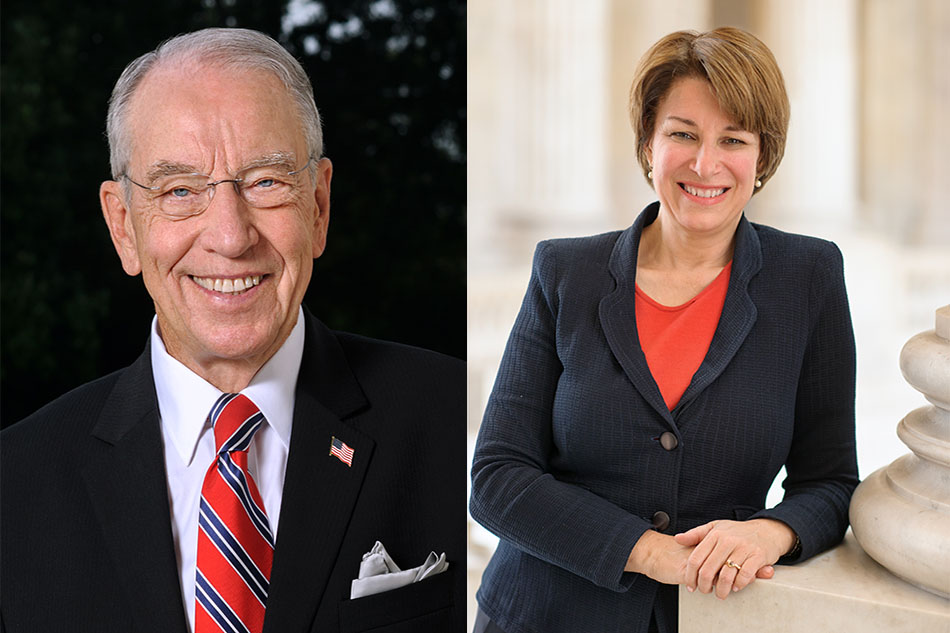Bill Would Prevent Big Tech Platform Favoritism
Sens. Chuck Grassley, Amy Klobuchar to bow measure barring companies from boosting their own platforms or goosing search results

The smarter way to stay on top of the multichannel video marketplace. Sign up below.
You are now subscribed
Your newsletter sign-up was successful
Sens. Charles Grassley (R-Iowa) and Amy Klobuchar (D-Minn.) signaled this week they will be introducing an antitrust-centric bill, the American Innovation and Choice Online Act, that would prevent tech platforms from favoring their own products or services, including by disadvantaging their rivals by biasing search results in favor of the dominant platform.
While no names were mentioned in the bill, Google, Amazon and Apple have all been the targets of criticism for favoring their own products and services. The bill is something of a break from the Facebook-centric aim of much of D.C. following the whistleblower revelations about that company in the past few weeks.
Also Read: Facebook's Big Tobacco Moment on the Hill
Klobuchar, chair of the Senate Antitrust Subcommittee, has been calling for Congress and the Federal Trade Commission to tighten scrutiny of Big Tech deals, arguing as have others that some of the biggest companies appeared to have bought up to monopoly by scooping up potential competitors before the deals were large enough to trigger scrutiny under the 1976 Hart Scott Rodino antitrust bill.
Specifically, according to Grassley's office, the bill would:
1. “Prohibit dominant platforms from abusing their gatekeeper power by favoring their own products or services, disadvantaging rivals, or discriminating among businesses that use their platforms in a manner that would materially harm competition on the platform; and
a. “Prohibit specific forms of conduct that are harmful to small businesses, entrepreneurs, and consumers, but that do not have any pro-competitive benefit, including:
i. “Preventing another business’s product or service from interoperating with the dominant platform or another business;
ii. “Requiring a business to buy a dominant platform’s goods or services for preferred placement on its platform;
iii. “Misusing a business’s data to compete against them; and
iv. “Biasing search results in favor of the dominant firm.
2. “Give antitrust enforcers strong, flexible tools to deter violations and hold dominant platforms accountable when they cross the line into illegal behavior, including significant civil penalties, authority to seek broad injunctions, emergency interim relief, and potential forfeiture of executive compensation.
3. “Prevent self-preferencing and discriminatory conduct by the most economically significant online platforms with large U.S. user bases which function as 'critical trading partners' for online businesses. For such platforms, the rules target harmful conduct, allowing the platforms to innovate, do business, and engage in pro-consumer conduct, including protecting user privacy and safety, preventing unlawful behavior, and maintaining a secure online experience for users.”
Said Klobuchar: “As dominant digital platforms — some of the biggest companies our world has ever seen — increasingly give preference to their own products and services, we must put policies in place to ensure small businesses and entrepreneurs still have the opportunity to succeed in the digital marketplace.”
“Big Tech needs to be held accountable if they behave in a discriminatory manner,” Grassley said.
Sen. Josh Hawley (R-Mo.), who supports the bill, said co-sponsores include Dick Durbin (D-Ill.), Lindsey Graham (R-S.C.), Richard Blumenthal (D-Conn.), John Kennedy (R-La.), Cory Booker (D-N.J.), Cynthia Lummis (R-Wyo.), Mazie Hirono (D-Hawaii), and Mark Warner (D-Va).
A similar bill was introduced in the House by Antitrust Subcommittee Chairman David Cicilline (D-R.I.) and ranking member Ken Buck (R-Colo.), which has already been voted out of the House Judiciary Committee, according to Hawley.
The smarter way to stay on top of the multichannel video marketplace. Sign up below.
Contributing editor John Eggerton has been an editor and/or writer on media regulation, legislation and policy for over four decades, including covering the FCC, FTC, Congress, the major media trade associations, and the federal courts. In addition to Multichannel News and Broadcasting + Cable, his work has appeared in Radio World, TV Technology, TV Fax, This Week in Consumer Electronics, Variety and the Encyclopedia Britannica.

